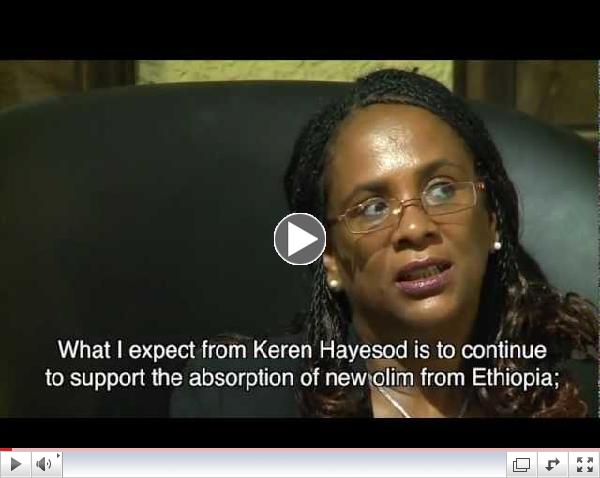Each year, torch lighters are selected to represent an aspect of Israeli society and to light 12 symbolic torches representing the 12 ancient tribes of Israel.
An initiative of Culture and Sports Minister Limor Livnat, the focus of this year's ceremony is "A Time for Women - Achievements and Challenges." The 14 torch lighters this year are all women, each with remarkable achievements, meaningful contribution to the state of Israel and Israeli society, and an inspiring life story.
Women to light up Israeli Independence Day
Ha'aretz
Women of Israel at 66: A celebration of achievement
Israel Ministry of Foreign Affairs
 |
|
Torch lighter, Dr. Kira Radinsky,
on "The journey to predict the future" at TEDxHiriya
|
 |
|
Torch lighter, Belaynesh Zevadia,
Ambassador to Ethiopia
|
Women in Israel
Since its establishment in 1948, the state of Israel has had the image of a country in which women enjoy full equality. This image, due to the liberal and socialist ethos of the Zionist
movement, is, however, somewhat misleading. While we celebrate the stellar achievements and remarkable advancement of women in the last few decades it is important to remember that there are many areas, in which traditions, social institutions, religious rules, and even laws have kept women at a disadvantage.
Read More
Women in Israel 2014
Israel Ministry of Foreign Affairs
Women in Israel: In Politics and Public Life by Naomi Chazan
Gaining Ground for Israeli Women by Prof. Alice Shalvi
Adva Center - Information on Equality and Social Justice in Israel:
10 Facts You Probably Didn't Know About Women in Israel (2010)
Wikipedia: Women in Israel
Book: Women in Israel-A State of Their Own by Ruth Halperin-Kaddari
Women's Organizations in Israel
Israel Women's Network
NA`AMAT- Movement of Working Women & Volunteers
 |
| Naamat: Then and Now (Pay it Forward) |
Yad L'isha
WIZO, the Women's International Zionist Organization
A List of Women's Organizations (in Hebrew)
Women of the Wall
Hadarat Nashim - The Exclusion of Women
When the issue of discrimination against women exploded on the Israeli scene during the winter of 2011, mixing long-simmering issues like sex-segregated busing and the absence of women from billboards in Jerusalem with new trends of ultra-Orthodox men publicly mistreating girls and women in Beit Shemesh, the phrase of choice in the local media was "hadarat nashim," literally meaning "the exclusion of women," referring to women and girls being excluded from the public domain. Enclosed a few articles about the new term and the controversy itself.
 |
|
A protest against the inclusion of women organized by WIZO
|
Ha'aretz: Word of the day / Hadarat nashim
Forward: New Words Coined To Exclude Women
Israel Hayom: Thousands protest exclusion of women in Beit Shemesh
Dr. Elana Maryles Sztokman in a two-part article:
7 Places Where Religious Radicalism Threatens Women's Well-Being in Israel
10 Inspiring Ways That Women Are Fighting for Justice in Israel
New York Times: Israelis Facing a Seismic Rift Over Role of Women
A very personal view and the doubts about raising a daughter in Israel:
State of Her Own by Erin Kopelow and Ariel Beery
|
|
Secular Israeli women performing a dance protest against the exclusion of women in Beit Shemesh
|
 |
|
Cartoonist Shlomo Cohen sums up the controversy with a twist on the morning blessing when men say "Blessed are you... that did not make me a woman" and women say "Blessed are you... the made me according to his will". In this cartoon the four accomplished women say : "Blessed are you... that made me according to my will"
|
Independence Day Poster - 2014
 |
|
Israel @ 66 - Time for Women
|
The poster designed for Israel's 66th anniversary reflects the annual theme. However, the design chosen by a ministerial committee is by a man. The designer, Ofir Merav, explained in an interview that a profile of a woman is dominantly and centrally situated in the state's symbol, her hair is composed of many colors and symbols expressing the diversity of women's achievements, she is in motion and is moving forward and upward.
How do you "read" this poster?
Do you think it successfully reflects on Israeli women's achievements?